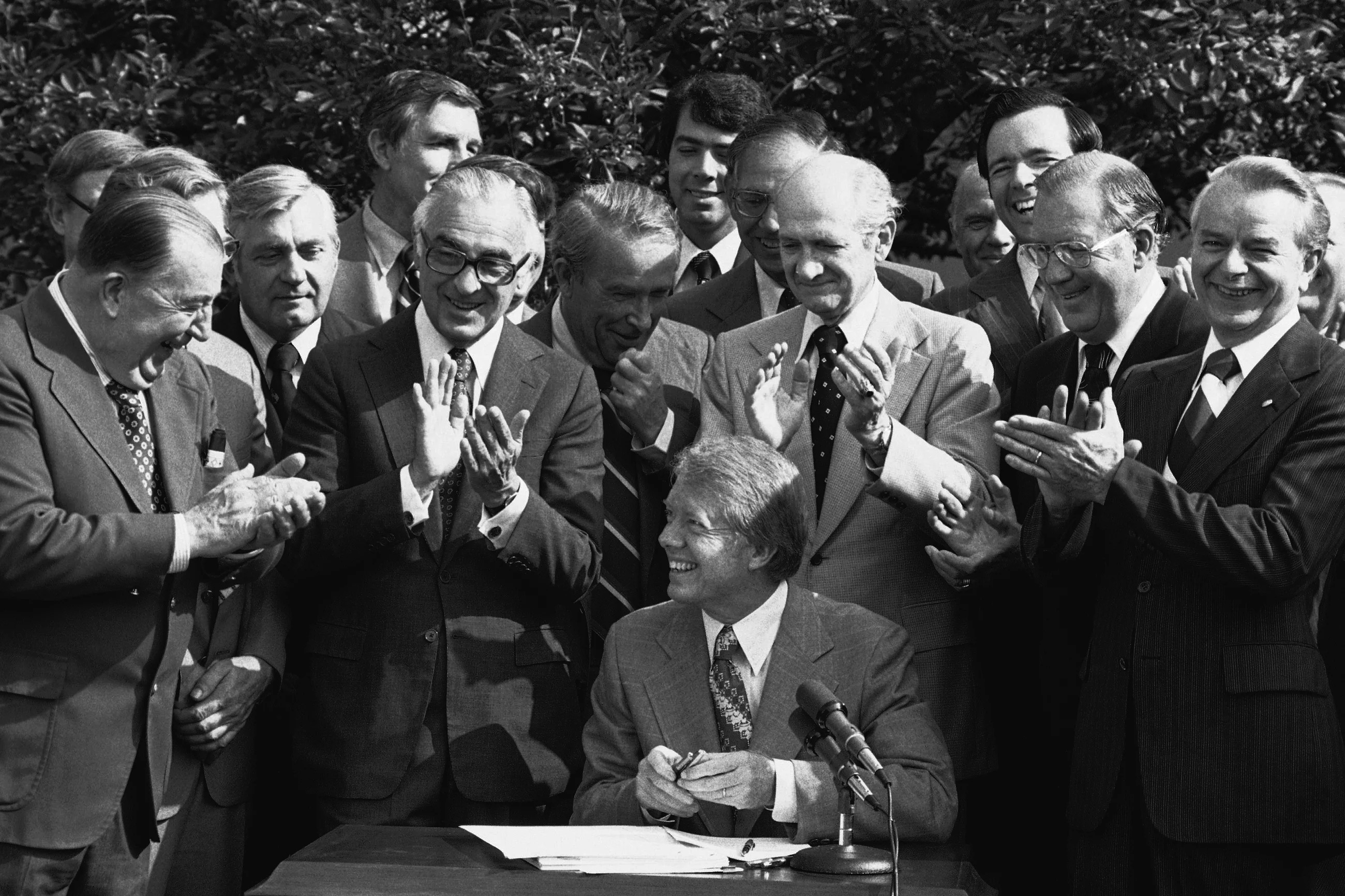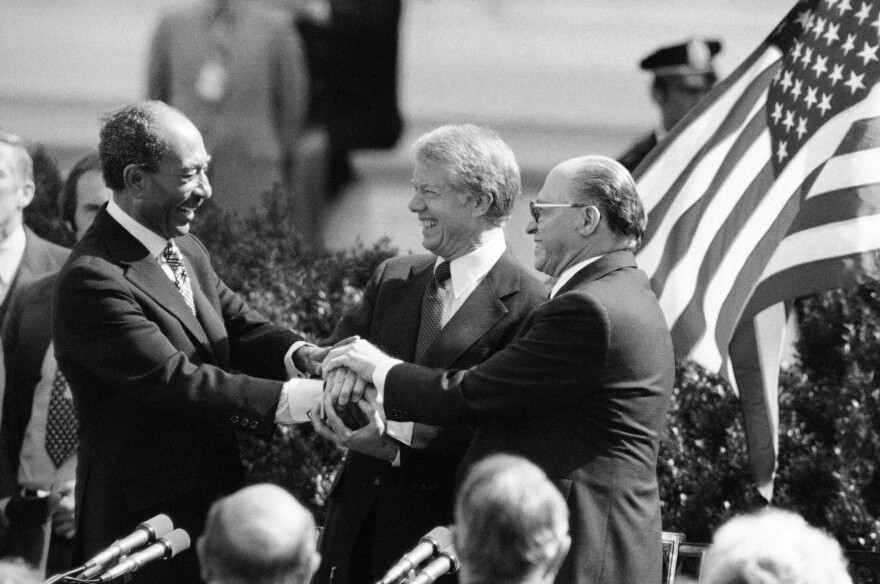09 Jan 2025
6 MIN READ
Top 10 Jimmy Carter Presidential Moments
Jimmy Carter, the 39th President of the United States, is better remembered for his post-presidency humanitarian work than his time in office. Born in Plains, Georgia, Carter’s upbringing revolved around peanut farming, devout Baptist faith, and political debates at the dinner table. He envisioned an America defined by “competent and compassionate” governance. He championed reforms in welfare, healthcare, and taxation. Still, he faced severe criticism by the end of his term due to a recession, energy crisis, Iran hostage situation, and strained relations within his party.
Carter holds a paradoxical legacy in American politics; he was revered and criticized in his time. In a nation reeling from the Watergate scandal, Carter offered hopes of transparency. A peanut farmer turned politician, Carter’s moral integrity was commendable, but his political finesse was questionable. Yet, his post-presidency period defined his legacy through humanitarian work, earning him the Nobel Peace Prize in 2002.

President Jimmy Carter receives the applause of members of Congress who witnessed his signature on a bill creating the Department of Energy in a Rose Garden ceremony Thursday, Aug. 4, 1977, at the White House in Washington, D.C. Source: https://news.azpm.org/p/news-npr/2024/12/29/223117-jimmy-carter-the-39th-us-president-has-died-at-100/
In honor of 100 years of Jimmy Carter’s remarkable life, here are the top 10 defining moments of his presidency and beyond:
1. Amnesty to draft dodgers
Carter’s legacy includes his efforts to heal post-Vietnam War divisions. The war polarized America, with many opposing it on moral grounds and resisting military conscription. Thousands fled to Canada and feared U.S. prosecution. Carter promised that he would issue a blanket pardon with no strings attached if elected. True to his campaign promise, Carter issued a blanket pardon on his second day in office in 1977, excluding violent offenders. This reconciliation had a lasting impact on U.S.-Canada relations and reinforced his commitment to mending a fractured nation.
2. A bold move in energy reform
Early in his presidency, Carter addressed the energy crisis caused by OPEC’s 1973 oil embargo and declining domestic production. He signed the Emergency Natural Gas Act, enabling gas price deregulation. The embargo, sparked by U.S. support for Israel, led to severe oil shortages and price hikes, prompting energy reforms. These included the 1974 Federal Energy Administration, the 1975 Energy Policy and Conservation Act, and the Strategic Petroleum Reserve—shaping a comprehensive federal energy strategy and elevating energy issues to national prominence.
3. Stand against Soviet communism
Despite controversial policies, Carter’s skillful letter-writing connected him with global leaders. During the Cold War, he expressed opposition to Communism through a letter to Soviet dissident Andrei Sakharov, a prominent advocate for human rights. Publicized by Sakharov, the letter conveyed Carter’s stance without confrontation, signaling his resolve against Soviet Communism. It set a precedent for future actions, demonstrating that Carter would actively address the Soviet threat. So far, Carter has maintained his position as a human rights advocate.
4. The cost of moral compromise
Carter’s 1977 visit to Tehran revealed a stark contrast to his promise of truth and human rights. Praising the Shah’s regime as an “island of stability,” Carter overlooked widespread oppression enforced by SAVAK, Iran’s secret police. His support aimed to secure U.S. strategic interests—oil, regional stability, and countering Soviet influence, over the democratic and humanitarian aspirations of the Iranian people. This move damaged Carter’s reputation at home and fueled Iran’s revolutionary fervour, exposing the compromises in U.S. foreign policy and undermining Carter’s moral leadership.
5. Camp David effort
The Camp David Accords, brokered by President Jimmy Carter in September 1978, marked a historic milestone in Middle Eastern diplomacy. Over 13 intense days, Carter mediated between Egyptian President Anwar Sadat and Israeli Prime Minister Menachem Begin, who refused direct meetings.

Egyptian President Anwar Sadat, left, President Jimmy Carter, center, and Israeli Prime Minister Menachem Begin clasp hands to symbolize their agreement after signing the Middle East Peace Treaty at the White House in Washington, March 27, 1979. Source: https://www.npr.org/sections/the-picture-show/2024/12/29/1158341137/a-look-back-at-jimmy-carters-presidency
On the brink of failure, Carter presented Begin with autographed photos inscribed with his grandchildren’s names and a heartfelt message of hope for peace. Moved by the gesture, Begin agreed to continue negotiations, leading to a breakthrough: Israel would withdraw from the Sinai Peninsula, and Egypt became the first Arab nation to recognize Israel. This landmark achievement remains one of the most significant contributions to Middle Eastern peace efforts. No U.S. president has dedicated as much personal time and energy to a foreign policy initiative as Carter did at Camp David.
6. The hostage crisis
The Iranian Hostage Crisis overshadowed Carter’s presidency, rooted in Iran's 1979 revolution that ousted the U.S.-backed Shah. Anti-American sentiment spiked when Carter admitted the Shah into the U.S. for medical treatment, prompting Islamist students to storm the U.S. Embassy in Tehran and take 52 Americans as hostages. Carter’s humanitarian decision backfired, portraying his administration as ineffective. The failed Operation Eagle Claw rescue mission, involving malfunctioning helicopters at Desert One, deepened the humiliation. Amid this, the “Canadian Caper,” a joint Canadian-CIA effort, successfully smuggled six diplomats out of Tehran. Despite tireless efforts, Carter’s inability to resolve the 444-day standoff damaged his reputation and contributed to his 1980 election loss. The hostages were released minutes after Reagan’s 1981 inauguration.
7. The Crisis of Confidence speech
In July 1979, amid economic turmoil and an energy crisis, President Jimmy Carter delivered his “Crisis of Confidence” address, later dubbed the "malaise speech," though he never used the word. He called for reducing reliance on foreign oil, taxing energy company profits, and investing in renewables. Initially well-received, it symbolized Carter’s perceived indecision as economic struggles and the Iran hostage crisis deepened. Critics contrasted his tone with Ronald Reagan's optimism, framing Carter as defeatist—a perception contributing to his landslide 1980 election loss. One scholar noted that Carter, who ran in 1976 promising “a government as good as the people,” now implied the people themselves were the problem.
8. Taft-Hartley Act invoked
In 1978, President Jimmy Carter invoked the Taft-Hartley Act to end a paralyzing 91-day coal strike, forcing 160,000 miners back to work under an 80-day cooling-off period. While the move aimed to stabilize energy supplies during economic unrest, it jeopardized union workers, who viewed it as a betrayal of labor rights. Carter’s broader policies, including deregulation and wage caps, deepened the divide with unions, undermining his pro-labor image and starkly contrasting with his campaign promises to support the working class.
9. The diplomatic U-turn
In 1979, President Jimmy Carter granted diplomatic recognition to the People’s Republic of China, ending decades of U.S. support for Taiwan. This Cold War pivot, formalized on January 1, included trade agreements and cultural exchanges, lifting China from isolation. While Beijing celebrated, Taiwan felt betrayed, accusing Carter of undermining their democratization efforts. His actions boosted China’s economy, allowed for religious freedom, and opened doors for Chinese students to study in the U.S. However, critics argue that Carter's shift, aimed at countering the Soviets, helped set the stage for China’s rise, ultimately creating one of America’s most formidable rivals while alienating a key ally in Taiwan.
10. The Afghan dilemma
In December 1979, the Soviet Union invaded Afghanistan, escalating Cold War tensions. The invasion aimed to establish a pro-Moscow regime amid civil unrest following controversial reforms by the left-wing People’s Democratic Party of Afghanistan (PDPA) and internal power struggles. The Soviets deposed the Afghan leader, installed Babrak Karmal, and began a decade-long military campaign. Fearing Soviet expansion, the U.S. provided covert support to the Mujahideen, aligning with China and Israel, imposing sanctions, boycotting the 1980 Moscow Olympics, and severing trade agreements. Carter’s policies, part of the Carter Doctrine, pressured the USSR but also set the stage for future conflicts, as many Mujahideen fighters, including Osama bin Laden, later opposed the U.S. Afghanistan becoming the Soviet Union's equivalent of Vietnam. This costly, unwinnable war ended in their 1988 withdrawal, leaving Afghanistan in chaos and fueling decades of civil war, eventually leading to the rise of the Taliban.
